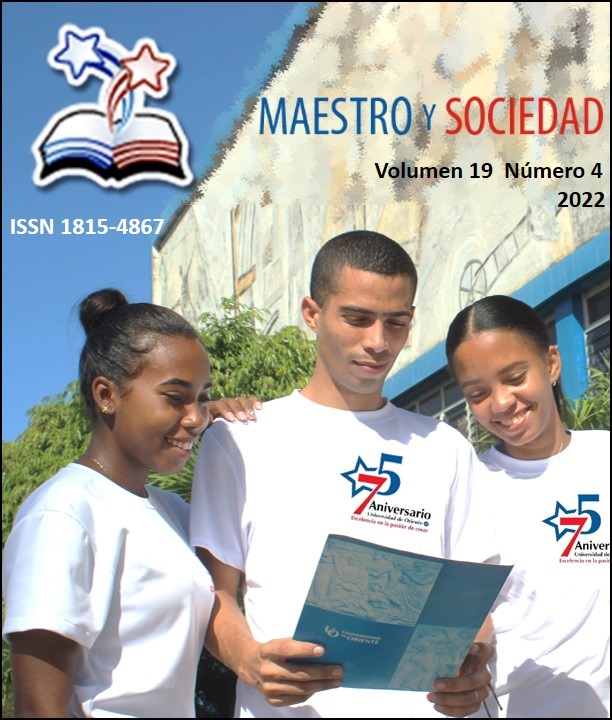The use of the educational resources opened up in the subject clinical Pharmacology
The use of the educational resources opened up in the subject clinical Pharmacology
Keywords:
open educational resources, methods of teaching learning, clinical pharmacologyAbstract
It was carried out a descriptive study of traverse court with the objective of checking the use of the open educational resources, in the teaching of the clinical Pharmacology in the University of Medical Sciences of Santiago from Cuba, during the second semester of the course 2020-2021. Para to develop the above-mentioned, he/she was carried out a registration of the use on the part of 150 students of third year of Medicine of the virtual classroom of this institution, to which were applied a survey, being obtained the following results: 56,6 % of the pupils used the open educational resources designed for the learning of the subject, 100 % of the students consented to the guides of questions designed with view to the execution of the general objectives of the discipline and 63,3 % of the educational it considers that the resources educational employees in the education are excellent.
References
Aramendi, P. A. (2018). El aprendizaje basado en la indagación en la enseñanza secundaria. Revista de Investigación Educativa, 36(1), 109-124. http://dx.doi.org/10.6018/rie.36.1.278991
Barba, R. S. (2018). “Presencia, participación y progreso”: el aprendizaje basado en proyectos en la trayectoria de una maestra en formación. Revista Electrónica Interuniversitaria de Formación del Profesorado, 21(2), 13-25.
Baser, D. Y. (2017). Collaborative project-based learning: an integrative science and technological education Project. Research in Science and Technological Education, 35(2), 131-148.
Campos, J. y. (2017). Futuros acerca de la profesión docente desde la mirada del alumnado de carreras de educación. Journal of New Approaches in Educational Research, 6(2), 87–92.
Chancusig Chisag, J. C. (2017). Didácticos interactivos a través de las TIC´S en el proceso de enseñanza matemática. Boletin Virtual, 6(4), 112–133. https://dialnet.unirioja.es/descarga/articulo/6119349.pdf
Chu, S. Z. (2017). The effectiveness of wikis for project-based learning in different disciplines in higher education. Internet and Higher Education, 33, 49-60.
Rivas A, A. F. (2017.). Cincuenta innovaciones educativas para escuelas. CIPPEC y Santillana.
Sebastián, S. & Tabakalera, E. (2017). Del aula al laboratorio. https://www.tabakalera.eu/sites/default/files/adjuntos/2017/ikasgelatik_es_ baja_1.pdf
Torres, A. y. (2017). Tendencias Educativas Contemporáneas del aprendizaje en red: Retos y Perspectivas. Curso 11.Congreso Pedagogía, Universidad Agraria de la Habana.
Villarroel, V. B. (2019). Using principles of authentic assessment to redesign written examinations and tests. Innovations in Education and Teaching International, 57(1), 38-49. https://doi.org/10.1080/1
Walss Aurioles, E. (2021). Diez herramientas digitales para facilitar la evaluación formativa. Tecnología. Ciencia y Educación, 18, 127-139. https://doi.org/10.51302/tce.2021.575
Zhang, X. (2020). Revisiting Textbook Adaption Through Open Educational. Resources: An Inquiry into Students’ Emotions. Research in Open and Distributed Learning, 21(3), 197–210. https://doi.org/10.19173/irrodl.v21i3.4775
Zulkifli, N. A. (2021). Online Applications to Support Remote Classroom. Dialogue and Assessment. Journal of Physics: Conference Series, 1779. doi:10.1088/1742-6596/1779/1/012039.
Published
How to Cite
Issue
Section
License
Copyright (c) 2022 Neity Mendo-Alcolea, Dania Diaz-Marin, Luis Ricardo Manet-Lahera

This work is licensed under a Creative Commons Attribution-NonCommercial-NoDerivatives 4.0 International License.
This journal provides immediate open access to its content, based on the principle that offering the public free access to research helps a greater global exchange of knowledge. Each author is responsible for the content of each of their articles.



























 Universidad de Oriente
Universidad de Oriente 